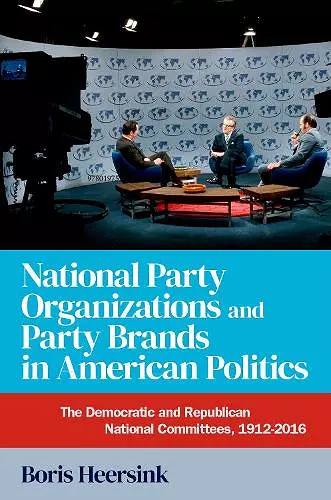National Party Organizations and Party Brands in American Politics
The Democratic and Republican National Committees, 1912-2016
Format:Hardback
Publisher:Oxford University Press Inc
Published:21st Nov '23
Currently unavailable, and unfortunately no date known when it will be back
This hardback is available in another edition too:
- Paperback£19.99(9780197695111)

A new assessment on the role, influence, and limitations of the Democratic and Republican National Committees in American political development. Scholars have long debated the role and importance of the Democratic and Republican National Committees in American politics. In National Party Organizations and Party Brands in American Politics, Boris Heersink identifies a core DNC and RNC role that has thus far been missed: creating national party brands. Drawing on extensive historical case studies and quantitative analysis, Heersink argues that the DNC and RNC have consistently prioritized their role of using publicity to inform voters about their parties' policies and priorities from the beginning of the twentieth century onwards. Both committees invested heavily in political communication tools with the goal of shaping voters' perceptions of their parties. As Heersink shows, the DNC and RNC often have considerable freedom in determining what type of brands to promote, placing them in the center of major intra-party debates in the twentieth century--including Prohibition, civil rights, foreign affairs, and economic policy. Analytically rigorous and marshaling a vast body of research on US elections between 1912 and 2016, this book highlights how important national party organizations are in setting the agenda in American politics.
Heersink offers a fresh and important new perspective on American political parties, challenging claims that formal party organizations are merely in service to candidates. Drawing on wide-ranging historical evidence, Heersink demonstrates national party committees have played a pivotal role in shaping their party's 'brand,' defining the party's positions and identity for voters. This impressive account will be of wide interest to students of political parties and representation. * Eric Schickler, University of California, Berkeley *
The parties' national committees have long been disregarded as irrelevant. Drawing from new data on committee activities and careful case studies, Boris Heersink convincingly challenges that conventional wisdom, demonstrating that the DNC and RNC have been at the center of their respective party's battles since the early 20th century. In particular, Heersink details the ways in which the party committees seek to shape their party's all-important brands—key to the parties' democracy-enhancing roles as information shortcuts—in collaboration and competition with other party actors. An important read for scholars of American parties and elections. * Christina Wolbrecht, University of Notre Dame *
American political parties are studied as organizations and as conveyors of information, but not until Boris Heersink's masterpiece have these two perspectives finally, and properly, met. In his diligent, methodologically rich, and empirically sophisticated study of national party committees, Heersink recasts the organizational development of the twentieth-century Democrats and Republicans. * Daniel Carpenter, Harvard University *
ISBN: 9780197695104
Dimensions: 156mm x 235mm x 23mm
Weight: 635g
360 pages